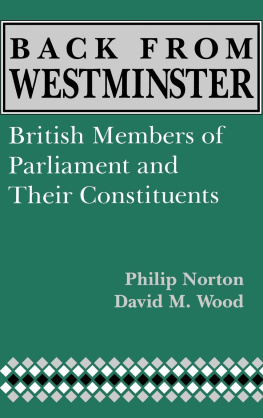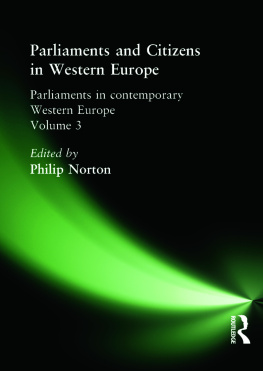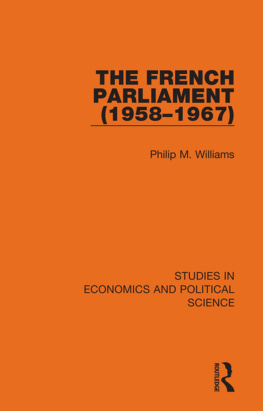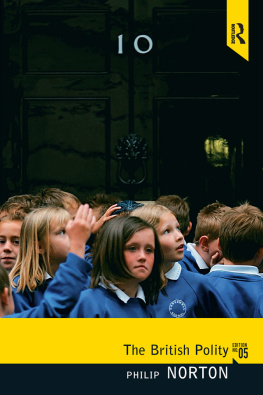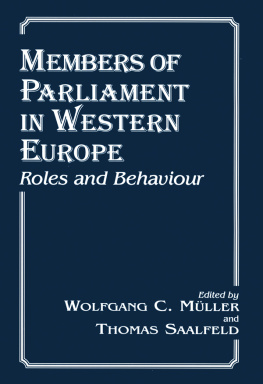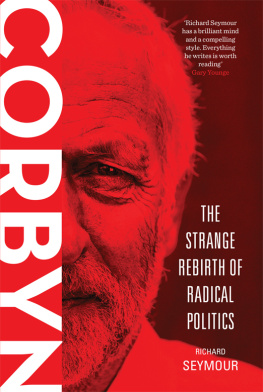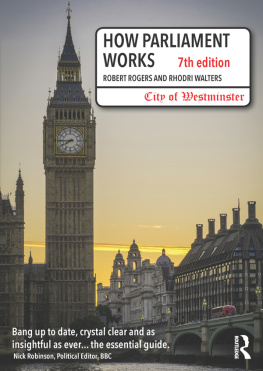Comparative Legislative Studies
Malcolm E. Jewell, Editor
BACK FROM
WESTMINSTER
British Members of
Parliament and
Their Constituents
Philip Norton
David M. Wood
Copyright 1993 by The University Press of Kentucky
Scholarly publisher for the Commonwealth,
serving Bellarmine College, Berea College, Centre
College of Kentucky, Eastern Kentucky University,
The Filson Club, Georgetown College, Kentucky
Historical Society, Kentucky State University,
Morehead State University, Murray State University,
Northern Kentucky University, Transylvania University,
University of Kentucky, University of Louisville,
and Western Kentucky University.
Editorial and Sales Offices: Lexington, Kentucky 40508-4008
Library of Congress Cataloging-in-Publication Data
Norton, Philip.
Back from Westminster : British members of Parliament and their constituents / Philip Norton and David M. Wood.
p.cm.(Comparative legislative studies series)
Includes bibliographical references (p. ) and index.
ISBN 0-8131-1834-4
1. Great Britain. Parliament. House of CommonsConstituent communication. 2. Great BritainPolitics and government1945I. Wood, David M. (David Michael), 1934. II. Title. III. Series.
JN673.N58 1993
328.410731dc20 93-14766
This book is printed on recycled acid-free paper meeting the requirements of the American National Standard for Permanence of Paper for Printed Library Materials.

Contents
Preface
It was the nineteenth-century politician John Bright who described England as the mother of parliaments. By virtue of its seniority in the family of parliaments, the British Parliament is both well known and often taken as an exemplar of a particular type of legislature. It has been the subject of considerable study. However, this study has tended to be of the institution of Parliament, rather than of parliamentarians. Insofar as students have been interested in the behavior of parliamentarians, that interest has been relatively recent and narrow in focus. The concentration has been on the relationship between Members of Parliament (MPs) and those of their number who form the government. The focus on legislative-executive relations is an important one, but it neglects another important dimension of parliamentary behavior: the relationship between MPs and their constituents.
Like members of the U.S. Congress, British Members of Parliament are elected to represent defined geographical districts. Like members of Congress, they face in two directions politically: toward Westminster and national affairs and toward their constituency and its local concerns and needs. The two faces are not mutually exclusive; they are analytically separable and each makes substantial, and different, demands on the legislators time, resources, and intellectual energy.
The relationship between the MP and the constituency in Britain has become more important in recent years, but changes in the relationship since the late 1960s have not been matched by extensive scholarly study. Some pathbreaking work has been done on the subject, but it remains overshadowed by the wealth of material focusing on the Westminster activities of MPs. This volume seeks to fill the gap by sketching and assessing the political, including the electoral, significance of the MPs other face. We believe that our findings allow the British Member of Parliament to be seen in full.
This work brings together the interests of both authors and builds on work we have already done both individually and jointly. In the early 1980s Norton made note of the fact that the volume of activity by MPs in corresponding with ministers on behalf of the needs of their individual constituents had been growing by leaps and bounds. Later in the decade Wood called attention to the activities MPs undertook on behalf of their constituents needs, especially those involving local economic interests.
Our first collaborative venture began in 1987 when Wood was a visiting scholar in the Hull University Politics Department, and it led to a study of what, if any, electoral payoff MPs derived from their constituency activities. Our finding that first-term incumbents achieved significantly better results than other candidates prompted further research. Our initial findings were published in article form in two journals, Parliamentary Affairs and Political Studies, and form the basis of part of this volume. The volume itself forms the completion of our wider study.
For advice and comments on the manuscript, we are especially grateful to Malcolm Jewell, the general editor of the series in which it appears. Financial and other assistance to David Wood in two research trips to England is gratefully acknowledged at the beginning of . Wood wishes to give particular thanks to the following individuals for their advice and assistance as the research progressed: Mark Hagger, Thad Brown, Wang Sik Kim, Yogesh Grover, Eric Anderson, and Brad Jones.
During the course of our research we have both benefited from the advice and comments of colleagues in the discipline of political science. We are grateful to them and to those politicians and other knowledgeables who kindly gave of their time to be interviewed. They have strengthened our work enormously. Responsibility for any errors or omissions rests solely with us.
1
Introduction
The British Parliament is widely seen as a deliberative body that reflects the diverse political views of the different social classes and geographical areas of the country but that most of the time responds favorably to the initiatives of executive leaders in performing its legislative function (Mezey 1979). Compared with the U.S. Congress, it is seen as a secondary and relatively passive policy-making body (Loewenberg and Patterson 1979).
The main reason that observers of the British Parliament assign it a relatively limited policy-making role is the dominance within the legislative arena of the two leading political parties, one or the other of which almost invariably will hold a majority in the House of Commons (Rose 1986). Indeed, Britain has been characterized as one of the few countries to exhibit both the format and the properties of a two-party system (Sartori 1976, 185). Possession of a parliamentary majority, coupled with strong party discipline (found in both parties whether in the majority or in opposition), allows the executive, itself comprising the leadership of the majority party, to control most significant activity in the House of Commons. This assures it of the adoption of its legislative agenda through cohesive majority party voting in divisions (roll call votes). A corollary of this is that the role of the individual backbench Member of Parliament (MP), whether of the majority or opposition party, is a weak one in policy-making terms.
The transatlantic contrast is stark. In both the Senate and the House of Representatives, party cohesion is weak, and, in any event, congressional party leadership is entirely separate from the executive branch. Congress has the leadership that allows it to challenge policy brought forward by the executive. In Parliament, the equivalent leadership is the executive. Congressional parties are not bound to support the executive leadership in roll call voting or other policy-related activity as are the members of the majority party in the House of Commons. In Congress, party votes (90 percent or more of the members of one party voting against 90 percent or more of members of the other) are the exception; in the House of Commons, they are the rule.

